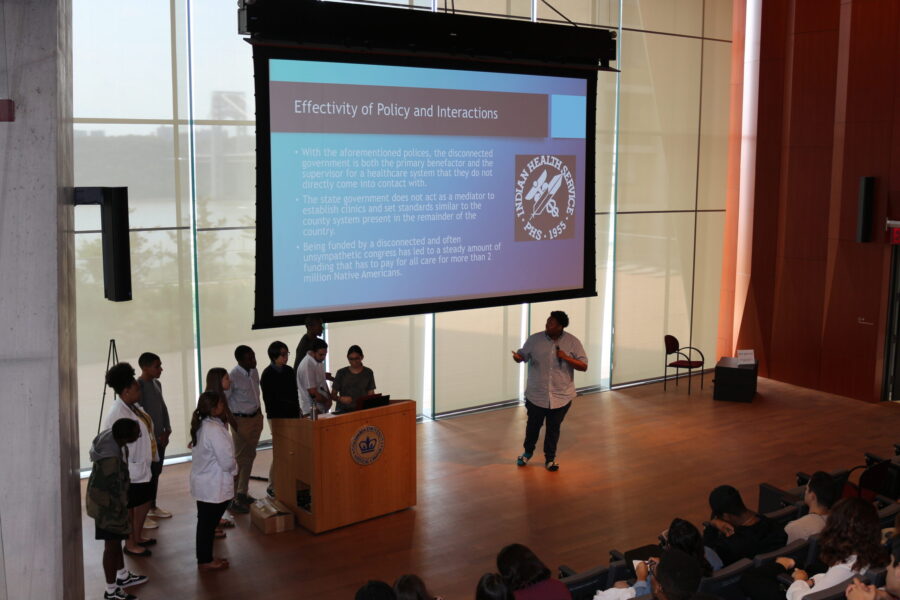Jan 2023
The SHPEP Alumni Engagement and Communication Committee interviewed graduate students on their experiences navigating a new program. Starting graduate school provides a challenge, and we asked them about resources, mentorship, and advice. Here is what they had to say!
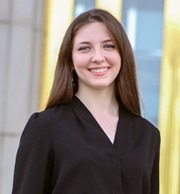
My name is Sidney Brown, and I am a first-year medical student in Mississippi. I am in the Doctorate of Osteopathic Medicine program at William Carey University.
Describe the challenges you faced at the beginning of your program.
I often heard the saying that medical school is like drinking from a fire hose. It really came true when we covered four years of undergrad material in the first exam. Needless to say, the first semester provided many trials and tribulations. It took me two exam blocks to finally figure out how to navigate each course. I searched YouTube, Reddit, and other sites for advice, and luckily I realized many of my classmates faced the same struggles. We were in it together, but there were also times of isolation. Getting my scores back provided more anxiety than I had ever experienced. I was encouraged to reach out to our campus academic counselors, which turned everything around. In our sessions, I realized I needed to study in a more supportive environment, and we worked to identify what I needed.
What resources did you utilize or find helpful when you first started the program?
I reviewed how I learned best, and it became apparent that I needed to touch and feel the concepts given to me on paper. That is why I performed better in lab-based courses. Typing notes didn’t benefit me as much as writing did. Using Play-Doh to make anatomical structures impacted me more than reading virtual flashcards. Your study methods should support whether you are a visual, auditory, or kinesthetic learner. Then, once you’ve found your learning style, utilize study resources that cater to your needs. Not everyone can Anki concepts, albeit there is a time and place for those methods.
Who was a mentor to you, and how did you meet?
I’ve met amazing mentors through organizations such as the American Medical Women’s Association, so keep an eye out for mentoring event sign-ups. I was paired with an MD/Masters of Business student, who was a year ahead of me. She helped ground me during my long and overwhelming application cycle, and now we have started medical school simultaneously. Also, keep in mind those with experience in a different field can sometimes provide a new perspective for you. For example, my grandfather served as an EMT, and he can answer some of my questions based on his experiences picking up patients and transporting them to hospital systems. All this to say, a mentor comes in all shapes and sizes. Seek those who are compassionate, motivating, and understanding of your journey.
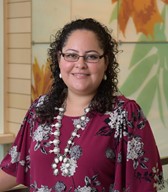
Hello everyone, my name is Jazmin Villavicencio; I am a member of the Chemehuevi Indian Tribe and a second-year student in the Health Service Administration Program at the University of Arizona Mel and Enid Zuckerman College of Public Health.
Describe the challenges you faced at the beginning of your program.
My biggest challenge at the beginning of the program was getting used to being back in “school mode.” You see, I took almost a 10-year gap after graduating with my undergraduate degree before I decided to return to school and pursue my Master’s degree. While a 10-year gap can seem like a lot, it honestly flew by. During that time, I had wonderful professional experiences and got to work in several positions throughout my home state of Arizona, especially in some of our Tribal and rural communities. It was those experiences that actually motivated me to pursue my Master’s degree. Another unique challenge was that I started my program in the middle of the COVID-19 pandemic in 2020, so I had to get used to taking most of my coursework online.
What resources did you utilize or find helpful when you first started the program?
Before starting my MPH program and throughout the application process, I met Samantha, a key staff member within my college who was an excellent resource for me as she helped me understand all the requirements within my program, as well as orient me as to how to enroll for classes and provide me support and advice on how to be successful as a graduate student within my program. Samantha also graduated from my program, so she knew exactly what I was going through. I know sometimes we tend to want to figure things out by ourselves or might be too shy or afraid to ask for help, but in a graduate program, you will need support. I hope you find the “Samantha” within your program; believe me, you will need it!
Who was a mentor to you, and how did you meet?
I actually attend graduate school at the same school where I completed my undergraduate studies, the University of Arizona, and have been blessed to have met many of my current mentors as an undergraduate student. I particularly appreciate the mentorship and support I have received from Dr. Teshia Solomon, who has encouraged me and believed in me every step of the way. Many of us sometimes struggle with imposter syndrome, especially if you are the first person in your family to pursue higher education. That said, having faculty and staff members that genuinely care and might even talk and look like us is highly encouraging and impactful. I encourage you to meet the faculty within your graduate program as you might find great lifelong mentors there. Also, please remember to mentor others even if you have yet to reach the level you want to achieve. There is always someone that could use our help!
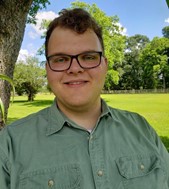
My name is Dillon Fountain, and I am a first-year graduate student in the Biomedical Masters Program at the University of Southern Mississippi.
Describe the challenges you faced at the beginning of your program.
Graduate school was a whole different experience compared to a Bachelor’s degree. For one, there is more emphasis on reading and writing than the simple memorization of facts from a PowerPoint. You still are expected to know the information on the PowerPoint slides, but you are also expected to understand the relative background information, be able to critically analyze the information given, and apply it in the laboratory and medical settings. Expanding at great length on the information provided in writing was difficult for my classmates and me.
What resources did you utilize or find helpful when you first started the program?
One resource I found helpful was the “read aloud” function on various scientific journals and Microsoft Word. Hearing a different voice and reading the words aloud improved my comprehension of what I was reading and my writing. In effect, listening to an essay I was writing helped me catch my mistakes and make my writing clear and concise.
Who was a mentor to you, and how did you meet?
My advisor, who was also the head of my program, was my most significant support and mentor. He is an experienced teacher who knows where most people struggle in his classes. He gave me tips on how to study effectively and how to best manage my time during and outside of class.
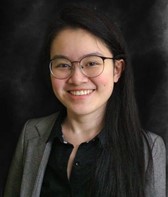
Hey there, my name is Skylar Mai. I am a second-year dental student at the UT Health School of Dentistry.
Describe the challenges you faced at the beginning of your program.
One of the challenges that unexpectedly came to the forefront is sticking to a healthy routine. When you’re in a professional or graduate program, it’s easy to fall into the trap of making that your primary focus and neglecting everything else. At the beginning of my school year, it was easy for me to get wrapped up in the scores and sacrifice everything else. As a result, there would be nights where I wouldn’t sleep until two or three in the morning, forget a meal, or skip a workout, thinking I would take care of it the following week. It’s important to remember that, at the end of the day, you are your biggest asset in graduate school. It’s essential to start building a consistent, healthy schedule and incorporate a good diet, sleep and workouts. Sticking with that, having an accountability partner helps.
What resources did you utilize or find helpful when you first started the program?
An often-forgotten resource that became really helpful to me is my school library. I’m fortunate that my school librarian is great at keeping a lot of things organized, including our class textbooks, clinic documents, and journals that you will often need to refer to. They even provide helpful links. I’m unsure if every school offers this, but I recommend you check your library’s website to see if your textbooks are accessible because those come in handy more often than not.
Who was a mentor to you, and how did you meet?
One of my mentors is actually a professor from a class that I did not do too hot in. I studied as much as I thought I could, but for some reason, I wasn’t doing well on the exams. It was in the middle of the year when I decided to get my stuff together, so I emailed the professor, went to his office hours, and discussed my previous exam performance and how I could do better. That turned into a long heart-to-heart conversation about what I need to succeed and what behavior I need to change to be a better student and professional. That motivated me to put effort and care into everything that I do. To this day, reaching out to professors gave me a different perspective on who I am in their classroom.

